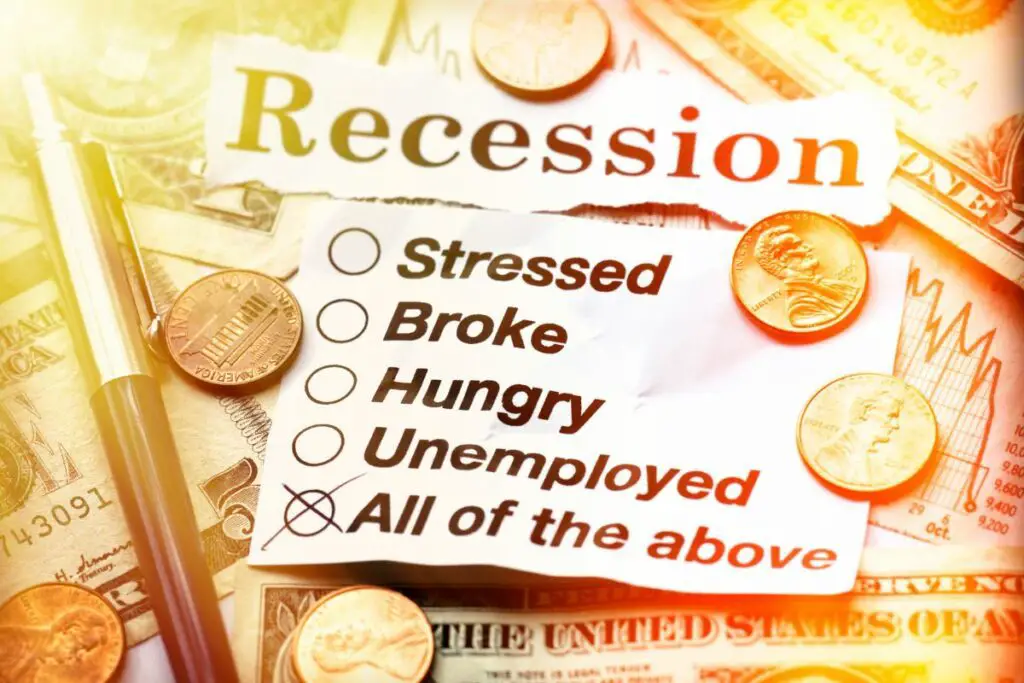We all know that the recession affects our pockets, but the greatest toll may actually be on our health.
Wondering how you would protect your health during a recession?
Well you should be…
It’s no secret that the economy has taken a turn for the worse in recent months. While economists and politicians debate the best way to fix things, the average person is just trying to get by.
It’s tough enough to make ends meet when money is tight, but it can be even harder when your health suffers as a result.
In this blog post, I’ll explore some of the ways that a recession can impact your health, and I’ll offer some tips on how to stay healthy during these tough times. Read on if you’re interested in learning more about this important topic.
- What is a recession?
- What causes a recession?
- Are we actually in a recession?
- What is the link between economic crisis and health?
- Tips to protect your health during a recession
- 1. Get informed, but change your focus
- 2. Prioritize your health now
- 3. Stay connected to protect your health
- 4. Have a plan for the recession
- 5. Work on your resilience and coping
- 6. Cut back on your expenses
- 7. Seek help if you need it
- Final words on tips to protect your health during a recession
- What are the best tips to cope with difficult situations?
- How can I overcome personal financial stress?
What is a recession?
A recession is a period of widespread, severe economic decline. It is characterized by a reduction in GDP, an increase in unemployment and a decline in production.
Traditionally, a recession is defined as two consecutive quarters of negative economic growth. However, this definition is often not enough to determine whether a recession is actually occurring.
Chúláin, 2022
In fact, significant economic growth preceding a financial crisis may make it more challenging to identify a recession until it is already underway – even though you may start to feel it’s effects much sooner.
What causes a recession?
Recessions can be caused by a variety of factors. They can be the result of structural problems within an economy, such as an over-reliance on one particular industry, increased interest rates, a decrease in consumer spending, or crash in the stock market. They can also be caused by external factors such as a natural disaster or an economic downturn in another country.
According to data from the National Bureau of Economic Research (NBER), from the year 1854 to 2020, the average recession in the United States lasted approximately 17 months. If we shift this timeline to the post World War II period (1945), the average recession had a duration of about 10 months.
Smith, 2022
Are we actually in a recession?
There is some debate over whether or not we are currently in a recession. However, although economists believe that currently we are not in a recession, many agree that we may be heading towards one.
What is the link between economic crisis and health?
The link between economic crisis and health is well-documented. Unfortunately, during periods of economic downturn, people are more likely to report poor health and wellness.
In fact, the effects of a recession can also ripple out into other areas of life. The reasons for this are complex, but it is thought that financial stressors such as job loss and reduced income can lead to poor mental health. For example, people who lose their jobs are more likely to experience relationship problems or housing insecurity.

The stress of financial insecurity can lead to a wide range of health problems, including anxiety, depression, cognition, and heart disease. This financial stress can also cause physical health problems, such as high blood pressure and ulcers.
In addition, when people lose their jobs, they also lose their health insurance. This means that they are more likely to go without preventive care and treatment for chronic conditions. In addition, they may be unable to afford healthy foods or housing, which can lead to poor health.
During tough economic times, people may lose their jobs, homes and savings. This can lead to increased crime, stress, anxiety, heart attacks and depression.
And, when people are under financial strain, they may be more likely to turn to unhealthy coping mechanisms such as smoking, drinking or overeating.
harvard public health, 2014
The stress of economic insecurity can also take a toll on mental health. The end result is that recessions can have a profound impact on the health of an entire population.
Health care costs also increase during a recession, as people delay care and end up requiring more expensive treatment. This can place a strain on the already strained resources of the health care system.
As such, even though a recession may be technically short-lived, the health direct and indirect health consequences of economic challenges often take years to overcome.
A study of the 1980s oil crisis and recession reported that the chances of dying doubled in the year after the men lost their jobs.
Although the risk of death decreased over the years, the risk was still significantly higher even 2 decades later.
As such, it is likely that a worker who is displaced at the age of 40 may have a decreased life expectancy of about 1 to 1.5 years.
harvard public health, 2022
Tips to protect your health during a recession
It’s clear that recessions have a significant impact on our health and wellbeing. As such, taking steps to protect our mental and physical health during these times is essential.
1. Get informed, but change your focus
First, it’s important to stay informed. Health literacy is crucial for improving your health and wellbeing. But, it’s equally important not to dwell on the negative news.
This can be difficult, but focusing on the bad news can make you feel more anxious and stressed. Instead change your focus to solutions and the things you can control. Remember that this too shall pass.
Fortunately, recessions are often followed by periods of growth, so try to stay positive and focus on the future.
Read also: Ultimate Guide To Overcome Limited Health Literacy
2. Prioritize your health now
Make sure you’re taking care of yourself physically right now. Eat a healthy diet, exercise regularly, and get enough sleep. Prevention is always better than cure.
So, make the sacrifice now to ensure that your future self is in the best shape – both literally and figuratively speaking.
Read also: Discover The Dos & Don’ts Of Healthy Living
3. Stay connected to protect your health
Social support has been shown to reduce stress levels and promote positive health outcomes. So, during this time of crisis, be sure to reach out to loved ones and stay connected with your community.
Doing so will not only help protect your mental health, but your physical health as well.
4. Have a plan for the recession
Fourth, make sure you have a plan for managing your finances. If job loss is a concern, start by creating a budget and looking for ways to cut back on expenses.
Have an emergency fund saved up and stay within your budget. By being proactive about our finances, we can weather the storm of a possible recession.
5. Work on your resilience and coping
Being able to manage stress is a key factor in maintaining good physical and mental health, and it can be especially important during tough economic times.
There are many things you can do to help build your resistance and coping skills, including: staying positive, setting realistic goals, maintaining a healthy lifestyle, relaxation techniques, and seeking social support.
Read also: 16 Proven Tips For Coping With Difficult Situations

6. Cut back on your expenses
To protect your health during a recession, find ways to decrease your expenses. For instance, avoid eating out and cook at home instead. Restaurants can be expensive, cooking at home gives you more control over your budget and allows you to save money.
Additionally, packing your own lunch is often cheaper than buying lunch out, and you can control what goes into your food.
Gardening is also a great way to save money on groceries and get some exercise. If you have some space, start a small vegetable garden. You can grow your own food and harvest it when it’s ready. Not only will you save money, but you’ll also get to enjoy the satisfaction of eating food you grew yourself.
7. Seek help if you need it
If you’re struggling with anxiety or depression, don’t hesitate to seek professional help. There are many resources available to help you during tough times.
Additionally, explore options for health coverage in case you do become uninsured. Taking steps to protect your health during times of economic turmoil can help you weather the storm and emerge healthy and strong.
Final words on tips to protect your health during a recession
The health of a nation is often the first and last thing to suffer in times of recession. This has been borne out by the experience of countries around the world over the years.
With increasing joblessness, lower incomes, and austerity measures, people’s health takes a hit. In this blog post, I’ve looked at some of the ways that economic recessions can impact on people’s health. I’d love to hear your thoughts. What has been your experience with regard to health and recession? Leave me a comment below.
Related topics
What are the best tips to cope with difficult situations?
While it is impossible to eliminate all difficult situations from our lives, there are some steps we can take to make them more manageable. One of the best ways to cope with a difficult situation is to have a plan.
By knowing what you need to do and having a clear goal in mind, you can stay focused and avoid getting overwhelmed. It can also be helpful to break the problem down into smaller pieces and tackle one step at a time. Read more
How can I overcome personal financial stress?
Financial stress is a common problem that can have a major impact on your life. If you’re struggling to make ends meet or worrying about money, it’s important to take steps to reduce your stress and regain control of your finances.
There are several things you can do to ease financial stress, including creating a budget, setting financial goals, and seeking help from a financial advisor. Taking these steps can help you get back on track and give you the peace of mind you need to focus on other aspects of your life. Read more
References
Chúláin N A., (2022) Are we headed for a new global recession? Economists are warning the next downturn is looming
Smith, K (2022) How long do recessions last?
Harvard Public Health (2014) Failing Economy, Failing Health









